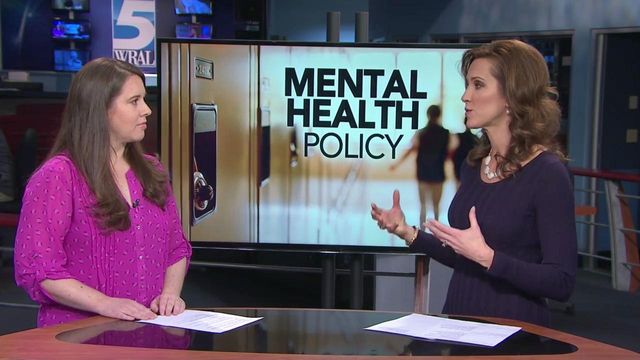State revising proposed mental health policy after outcry from schools
State education leaders are revising a proposed mental health policy for public schools after charter schools and school boards objected to the guidelines, calling them well-meaning but too burdensome and expensive to implement.
Posted — UpdatedThe State Board of Education was expected to vote on the policy in March, but the vote has been delayed until April so staff can make changes.
The proposal also calls for schools to improve their staffing ratios of licensed counselors, nurses, social workers and others "to align with nationally recognized ratios."
The policy drew objections this month from the North Carolina Association for Public Charter Schools and the North Carolina School Boards Association, which partnered to oppose what they call an "unfunded mandate."
The policy "looks innocuous until you actually think about it and realize what the implications are," said Lee Teague, executive director of the association for public charter schools. "I’ve had several school operators tell me that the extra burden would be very difficult for them to meet and could potentially affect the classroom."
Teague said he has heard from leaders at nearly a dozen charter schools who objected to the policy and said more complaints would likely follow if it was not changed. He shared several letters from charter school leaders who emailed the State Board of Education, including one from a superintendent who said his school takes mental health seriously, especially after losing a student last year.
"One of the most difficult things I have ever had to do was attend the funeral of a student who committed suicide," Superintendent Tom Simmons wrote to state board members on Feb. 9.
Simmons leads Thomas Academy, a rural charter school in Columbus County, and said the death of the teenage girl prompted changes at his school, including a renewed focus on students' mental health.
"Every kid in this school has a mentor on this campus so that they can call and say, ‘I need to talk to somebody,'" Simmons told WRAL News by phone this week. "It may not even be anybody at school. It may be somebody over in our financial office. It may be somebody in the maintenance department. But it’s someone that they have formed a bond with and they know that anytime during the day they can call them and say, 'I need to talk to you.'"
Simmons said schools should have the flexibility to develop their own mental health programs and not be forced into a "one-size-fits-all" plan from the state.
"I just think that the state, while I think they’re well-meaning folks, if they’re going to mandate this, they need to put some funding to it," he said.
David Kukielski, head of the Carolina International School in Concord, also emailed the state board to share his concerns. His school has a full-time counselor for its 900 students in grades kindergarten through 12th and a part-time high school counselor.
"If our budget were to allow, we’d certainly increase our mental health team, even in part-time ways. But as a charter school leader, I hope for flexibility in working towards providing such, especially when monies are tight," Kukielski wrote to board members on Feb. 14.
The state Department of Public Instruction began focusing more on mental health issues about a year and a half ago, according to Bill Hussey, director of the Exceptional Children Division for the department. It was spurred in part by stories he and others heard while talking with schools across the state.
"I can’t go anywhere without getting myself involved in some conversation about the issues of mental health in schools and what’s going on and the difficulties," he said.
Hussey said he has been working this week to revise the proposed mental health policy, which he says was intended to be "suggestions, not absolutes" for schools to follow.
"We don’t want to push anything on anybody," he said. "We don’t want to try to create a separate mental health system."
There are two main things the state wants public schools to do, Hussey said. First, schools should make sure all staff members get mental health training. The state will help coordinate the training, and it will be free, he said.
Second, schools need to make sure students have access to mental health support if they need it. That could be through trained staff at the schools, such as school nurses or social workers, or through collaborations with local mental health providers. Schools should make referrals for mental health services in concert with the children's parents, Hussey said.
As for the proposal to improve schools' staffing ratios of counselors, nurses and others, Hussey said the ratios are not magic numbers that each school must hit. Instead, they should serve as goals for schools to work towards.
Those and other changes are expected to be included in the state's revised mental health policy proposal, which has not yet been released. For now, the state association for public charter schools and school boards association are withholding their comments until they see the final draft.
"We’re not denying there’s a problem. I think it is a real problem," Teague said. "We just think this (current proposed policy) is a bad solution."
• Credits
Copyright 2024 by Capitol Broadcasting Company. All rights reserved. This material may not be published, broadcast, rewritten or redistributed.





